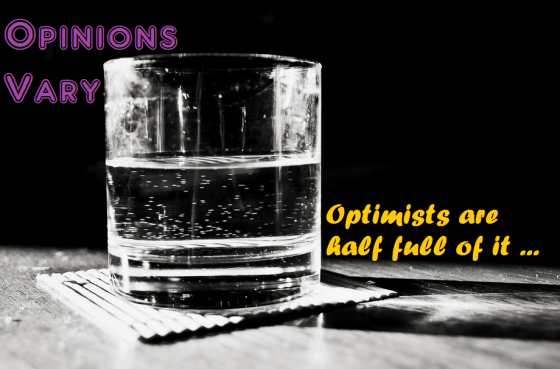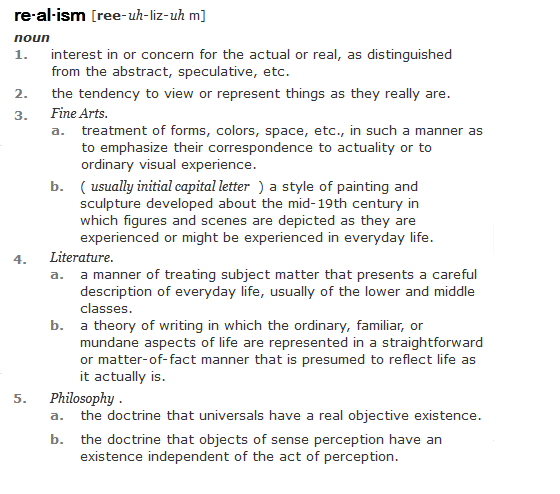Opinions Vary: Optimists are half full of it …

… and pessimist’s brains are half empty.
There’s something to be said for choosing a side in most every battle. The eternal struggle between optimism and pessimism however is one of those battlegrounds that I would always avoid. You see dear reader, I am a realist. I see the world and the people in it for what they are, not what I would hope those to be, like the optimist. I don’t project my own values and bitterness on the world as does the pessimist. However, before we delve further we must understand to two opposite sides of the spectrum if we are to find the creamy center. And nougat. Sweet delicious nougat.
Using a dictionary, we can see that optimism is broken down into four distinct tenants. They are as follows:

Now, I could almost get on board with the first one. Looking at everything in the most favorable light. That makes me happy. I like being happy. However you see that last bit tacked on at the end there? The part about always expecting the most favorable outcome. It’s utter horseshit. If you are a person who expects too much out of every outcome you are setting yourself up for disappointment every time. Can you imagine if all your surprises sucked? That is of course the most extreme case. No one walks around like that. However since life is a crapshoot, it is prudent to prepare for the worse, this way all your surprises are pleasant.
The second one I disagree with because of the use of the terms good and evil. Good and evil are matters of perspective. There are of course examples of pure good and pure evil out there, but they are rarer than you think. Lance Armstrong is a great example of this. He helped millions of people with cancer. He raised money to ensure that research can be cutting edge and innovative. That’s good, right? Well he also cheated in a couple of bicycle races and sued people that called him a cheater. So how do we determine his morality? Do we take only the good and ignore the bad? Isn’t that what the optimist would do? Look at him in the most positive of lights? Or do we just take the negative like the pessimist would? Or like the realist do we simple accept the natural order of complex issues and sort them accordingly? Lance Armstrong is a dick who did a lot of good.
Number three is very similar to number two in its matter of perspective. I live in America. I was born here, and I’ll die here. I may bitch, complain, and groan like a spoiled brat every time my government does something I object to, but for the most part, I believe America is in the moral good. However that is not a global belief. Depending on where you go, America is arrogant, power hungry, decadent, and even evil. Who is right? Isn’t it small minded of me to believe that I am right if the rest of the world believes I’m wrong? Isn’t it hypocritical to side with the rest of the world yet still adhere to the values and laws that are so unpopular? Or do we simply accept the situation and deal with it accordingly?
Number four is just as simple as the last two. Again, it boils down to perspective of the one versus perspective of the whole. I was lucky enough to be born in America to American citizens. I don’t have a lot of worries that a good portion of the world has. There have been studies that suggest about a fifth of the world’s population in developing nations (roughly 1.2 billion people) lives on $1 a day. That would get me from 8:00 am to 8:30 am. So how is it the best possible reality when so many people are suffering? I am by no means well off by American standards, so how is it the best possible reality when so many have it so good whilst I’m toiling away in my petty little life? The grass is always greener on the other side because we spend so little time looking down and realize where we are and what we already have. We also don’t always consider the circumstances it takes to get that “greener grass.”
—
Now that we’ve tackled optimism, let’s jaunt over to the other side shall we? Pessimism seems to be broken into three parts.

Looking at the first one, I half agree with it. I made this point with the first part of optimism. Expect the worst and you’ll be prepared for every outcome. The first part just seems wrong. I am not opposed to mentioning or noting adverse aspects of object or people, but the use of the word emphasize puts me off. It conjures up the feeling that you completely ignore the good or the merits of things. If I could only see the bad or evil of the world, I’d probably kill myself out of what I could only describe as super depression.
The second portion is broken up into two parts and both of those parts deal with morality. As I discussed earlier, morality is a matter of perspective. So to assert that reality itself is evil is to assert that reality has a moral code. This then begs the question, what is reality? Philip K. Dick was as close to an expert on the field as anyone. When asked that very question he responded with “Reality is that which, when you stop believing in it, doesn’t go away.” If I stop believing in evil, does it go away? Nope, people are still suffering throughout the world. What about good then? If I believe in good, does it go away? Nope. There are plenty of happy people out there helping others, and positively influencing the world. I guess reality is both good and evil.
This is where the second part of number two comes in. It is essentially answering the question “What is more prevalent, good or evil?” Of course the pessimists say evil. If I were to answer the question, I would say good, lumping me in with the optimists. We’re both wrong. There’s no way of knowing. If you asked everyone on the planet if they though that they were good or evil, the overwhelming majority would say that they themselves were good. This brings back the perspective argument or morality. So if the overwhelming population of the world is good, why is there so much evil? With all these good people in the world, why do we not simply stamp out evil? Edmund Burke stated that “All that is necessary for the triumph of evil is that good men do nothing.” So is it inaction of good that permits evil to exist, or the differentiating of morality in relation to perspective that deems deviation is evil? Either way to perceive that evil overbalances happiness in life seems more of a personal observation based around perceived reality rather than a global notion of morality and happiness.
If you’re starting to get lost, fear not, I’m lumbering toward a point eventually.
—
Now let’s tackle realism with the same scrutiny.

Wow, that seems like a lot. Fortunately for us today we’re really only interested in the first two and the fifth ones.
The first definition is pretty straight forward, much like realism itself. It’s the concern for the actual over concern for the ambiguous. So what does that actually mean? Its means that real threats are more of a concern than perceived ones. It means that real insults are more infuriating than perceived ones. It means that actions are louder than inaction. It means that words and thoughts are meaningless in a vacuum.
The second one is a bit trickier as it relies on both perceiving the world and a realization that your perception doesn’t matter. For an example, I’ll use myself. For the most part, I perceive humans as good. I have good parents and good friends. Since I’m surrounded by nothing but good people, how am I able to conceive that a human, on an individual level can be evil? Well, despite not seeing in my life, I know that evil exists. It will not go away simply because I am not in its presence. So despite my perception of good people, I must account for and acknowledge evil people exist, and I will not be able to tell them apart from the good people without some form of objective proof. This would explain why I’m cautious around strangers until I get a better feel of what their motives and intentions are.
Finally we come to definition five. In layman’s terms this is essentially the same principle as the second one. Objects exist in their own right independent of your perception of them. The second part of this definition is the awareness of how little your perception matters on the existence and being of objects outside of yourself.
—
So what does all this mean? Nothing. I, like everyone else, reserve the right to change my ideas, views, opinions, and doctrine at will and on the fly. Does this make me a hypocrite? Yes. Yes it does, and I’m ok with that. Don’t be defined by labels other people put on you. Don’t even be defined by the labels and rules you set for yourself. Just don’t be a dick. That’s the one rule in my religion which I’m naming Dude-eronomy.



